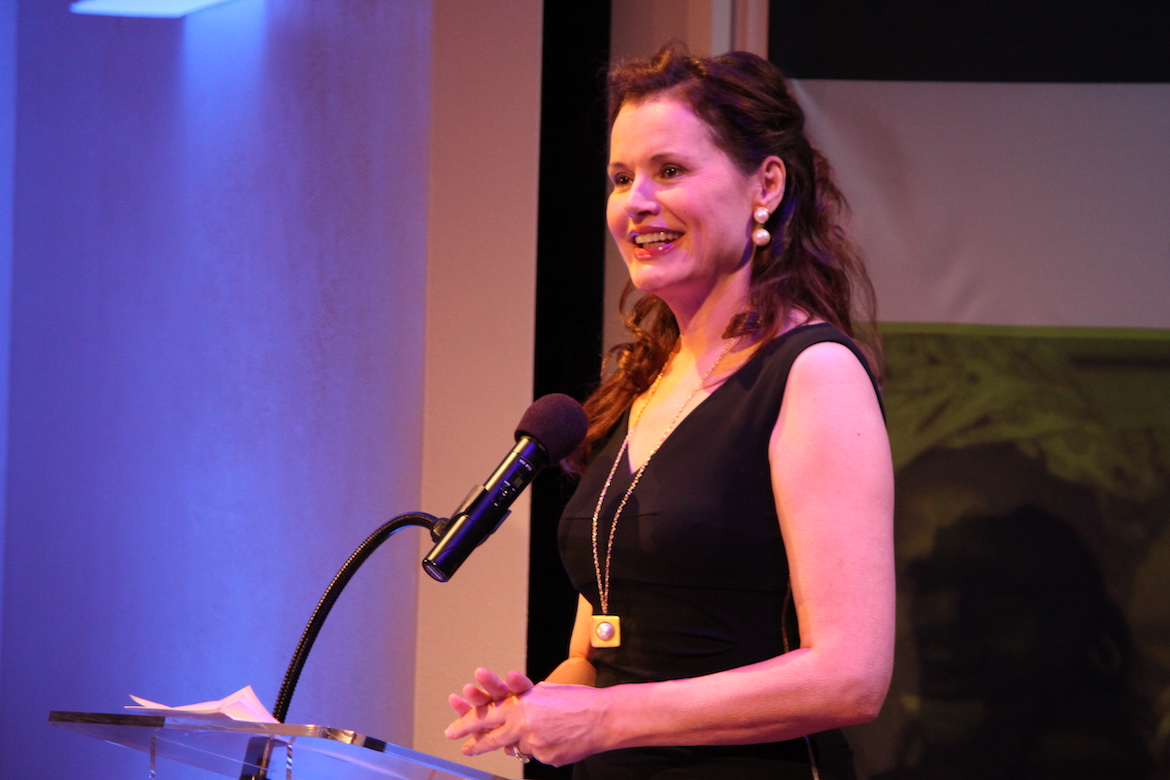Geena Davis is an American actress, producer, screenwriter, model, activist and archer.
In 2011, she became one of a handful of celebrities attached to the USAID (United States Agency for International Development) and Ad Council's FWD ("Famine, War and Drought") campaign, an initiative to raise awareness about the severe drought that was occurring in East Africa that year.
Geena Davis joined Uma Thurman, Chanel Iman and Josh Hartnett in this campaign, participating in a series of public service announcements aired through television commercials and social media. The campaign was designed to encourage Americans to raise awareness of the crisis, support humanitarian organizations conducting relief efforts and consult with the Feed the Future global initiative for broader solutions.
Davis also supports the Women's Sports Foundation, a nonprofit charity focused on women's involvement in sports. Founded in 1974 by tennis player Billie Jean King, and initially supported by Olympians Donna de Varona and Suzy Chaffee, WSF's mission is to "to advance the lives of girls and women through sports and physical activity."
It also advocates for Title IX, a congressional law focused on equal opportunity in sports, now expanded to prohibit gender discrimination in U.S. educational institutions.
Also in an effort to combat prejudice and discrimination against women, Geena Davis has been a vocal advocate since 2004 for the fight against girl/boy stereotypes in children's programming. It was while watching television with her daughter that she noticed this imbalance in the relationship between male and female characters.
She subsequently sponsored the largest-ever research project on gender in children's entertainment at the University of Southern California's Annenberg School for Communication, which resulted in four separate studies led by Dr. Stacy Smith.
Of the four studies, one found that three times as many men as women appeared in children's movies, while in children's television, there were 1.67 men for every woman.
A second study by the group showed that in G-rated films, 80.5% of the characters were male, compared to only 19.5% of female characters.
Another study showed that there were nearly three male characters for every female character. Of 122 G-, PG-, and PG-13-rated films released in theaters between 2006 and 2009, only 29.2% of all speaking characters were female, and these women were more sexualized than men. Given that children are in contact with media for up to 7-10 hours a day, the portrayal of women in children's television shows and movies has a major impact on how young girls believe they should act and how they perceive themselves.
In 2005, Davis partnered with the nonprofit group Dads and Daughters to launch an initiative to balance the number of male and female characters in children's television and film programs.
In 2007, she founded the Geena Davis Institute on Gender in Media. The Institute conducts research on gender disparities in media and works with the entertainment industry to increase the presence of female characters in children's media, as well as to reduce inequality in Hollywood and female stereotypes in a male-dominated industry.
One of the reasons Davis started her foundation was her personal experience with Hollywood's sexist treatment of older women. For her, "Film roles really did start to dry up when I got into my 40's. If you look at IMDb, up until that age I made roughly one film a year. In my entire 40's, I made one movie, Stuart Little."
The Geena Davis Institute on Gender in Media is the only research-based organization working within the media to share, educate, influence and explain the need for gender balance. It is a leading voice in creating a wide variety of roles for women in the entertainment industry, challenging stereotypes of female characters and advocating for roles that empower women rather than denigrate them.
"The fact is women are seriously underrepresented in nearly all sectors of society across the globe, not just on screen, but, for the most part, we are simply not aware to this reality, and media images exert a powerful influence in perpetuating our unconscious bias."
Through her industry connections, Davis presents these statistics to media executives to raise awareness of the low representation of women in the media, especially in children's entertainment, one of the foundation's primary focuses.
The institute has achieved several notable research results and has built one of the largest repositories of research on the intersection of gender and media over the past 25 years.
Engaged in several large-scale research projects regarding the current conditions of women in mass media, the institute collaborates with several other nonprofit organizations and societies to highlight their feelings about the need to reform the way women are represented in popular culture.
In 2010, in collaboration with the Academy of Television Arts and Sciences Foundation, the institute created a $5,000 award for diversity in children's animation created by college students.
In addition to its many research contributions, the Geena Davis Institute on Gender in Media also created the Bentonville Film Festival, an annual event that also features concerts with different artists each year.
Nearly 100 films are screened at the festival. Those that attend are guaranteed distribution, a move Davis believes will address the disproportionate number of female creators in Hollywood.
As a result of her work to combat gender stereotypes and discrimination, Geena Davis received an honorary Doctor of Fine Arts degree from Bates College in May 2009. In 2019, she also receives an honorary Oscar, the Jean Hersholt Humanitarian Award, an award given periodically since 1956 by AMPAS (Academy of Motion Picture Arts and Sciences) to recognize "outstanding contributions to humanitarian causes" by a film personality.
Geena Davis Institute on Gender in Media
Written By Julie Poutrel for Adama Toulon.
© Photo: DFID - UK Department for International Development - CC BY 2.0


